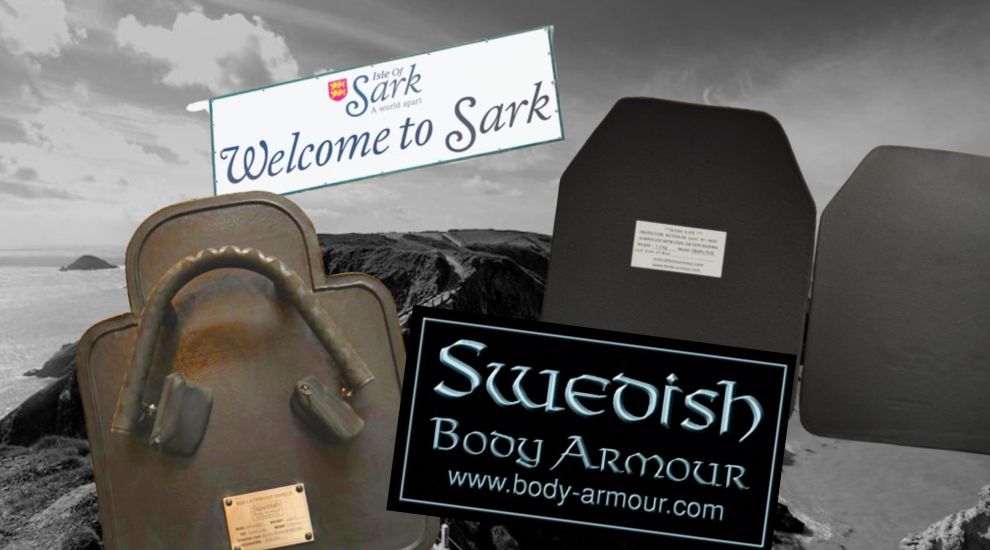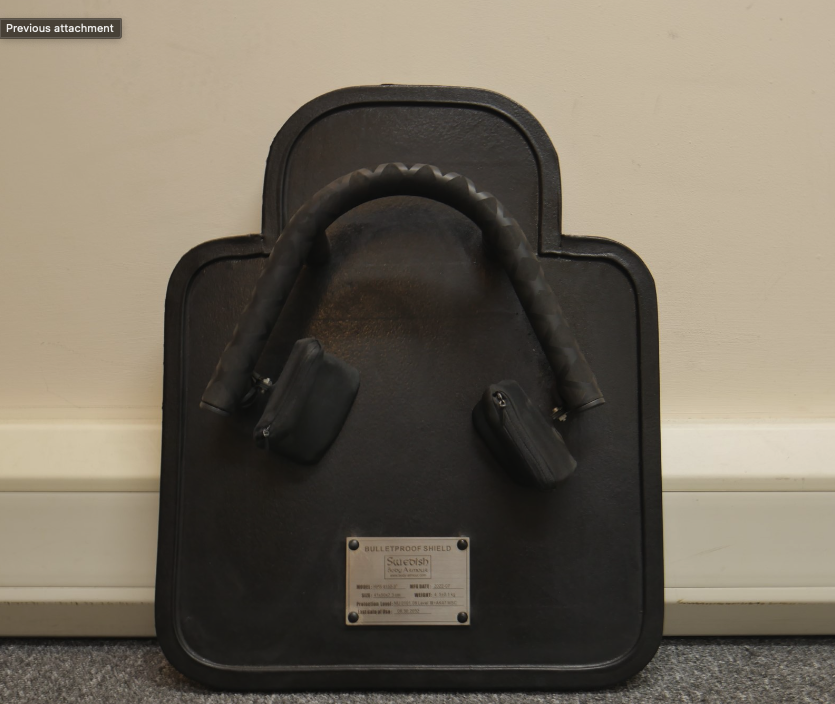


A body armour dealer suspected to have relocated to Sark to conceal his true business activities has lost a fight to avoid prison for shipping ballistic shields to a restricted part of China in a landmark case for the Channel Islands.
Swedish national Gal Fridman – who claimed he had previously supplied defence gear to BBC war correspondents – imported 162 items of military gear from a Chinese factory to Guernsey in late 2022.
He then sent 14 boxes onwards to special administrative region and Eastern gambling capital Macau, instructing the freight handler to label them as “float boards” to avoid suspicion.
But the shipment was intercepted by border officials who determined after liaising with UK authorities that they were military items being sent in breach of an active arms embargo.

Pictured: Fridman instructed the freight handler to label the 162 items of military gear as “float boards” to avoid suspicion.
Fridman, who had been on bail since January, was sent immediately to prison on Friday after Guernsey’s Court of Appeal decided that a one-year prison sentence would not be manifestly excessive, but an important deterrent aligned with international obligations to prevent instability and repression in other jurisdictions.
The case is a landmark for the Channel Islands – and one of just a handful to have ever been heard in the British Isles.
Fridman first relocated in 2021 in response to a drive by notable resident Swen Lorenz, which sold the island as a "European, English-speaking microstate where you can live free from excessive taxation and government regulation”.
There, he planned to continue his Swedish Body Armour business, which he had operated from various European countries for more than three decades.

Pictured: Fridman’s business sold security and protective equipment.
Based online, the business offers everything from expandable security batons to impact protective helmets, "slash-resistant gloves" and gear for "covert operations" and describes itself as offering "competitive prices and fast delivery time not available elsewhere".
According to his lawyer, Fridman did not relocate to the island to avoid suspicion – in fact, he notified the GBA about his business when he moved.
“He did not come to the island to continue clandestine trades under the radar,” Advocate Sara Mallett said.
It was in late 2022 that his activity raised suspicions.
A consignment of goods was manufactured and shipped to Guernsey from a Chinese factory between November and December 2022. It contained 162 items in total, with a value of around €6,000.

Pictured: Gal Fridman (59) had pleaded guilty to to making false import declarations for ballistic shields and body armour panels.
Fridman arranged with various Guernsey freight companies for the storage and forwarding of some of the 20 boxes onwards to Macau, while the remainder were to be kept in Sark.
He described the goods as “float boards” and instructed the freight handler to change an invoice which described them as bulletproof shields, later instructing the firm to organise the export of 14 boxes to Macau.
Customs officers later inspected these and found bulletproof shields, ballistic shields and body plates.
Macau is a specialist administrative region of the People’s Republic of China, meaning it is able to operate its own political and economic system.
However, the arrangement means it generally falls under the same types of trade restrictions as imposed on China – including those relating to goods that can be used as lethal weapons or, more broadly, used for repression.
Anyone who wishes to export such goods to the restricted region therefore needs special permission – which Fridman did not have.
As he disembarked a flight from London Gatwick on 14 June last year, Fridman was arrested.
A search of his home in Sark uncovered six boxes containing 90 pieces of body armour and one shield that he was in the process of customising.

Pictured: Fridman ran the business Swedish Body Armour.
Fridman voluntarily provided passcodes for two mobile phones and a laptop and correspondence was found with the manufacturer relating to the import and export.
That correspondence revealed how he had requested they stop using military-linked descriptions as he feared government authorities were attempting to disrupt his business activities.
Fridman also explained that “floatation devices” would provoke less suspicion to Customs than other descriptions.
Grilled by officers, he said it would be “impossible” to carry out his business with licenses or customs approval and that he was unaware that Macau had been under embargo since 2022.
But investigations found that the address in Macau had links with a gun shop.
Fridman said he was unaware of this and couldn’t recall telling the freight firm to change information on the invoice.
He also maintained that the items being shipped on that occasion were black laminated polyethylene boards to help with floatation – these were to be used in a prototype way for boating purposes, he claimed.
Fridman also claimed the items had been mislabelled in the box and suggested they wouldn’t be capable of withstanding gunfire.
While Fridman attempted to resolve the situation out of court with the GBA, his efforts did not succeed and he in January he came before the Royal Court, having pleaded guilty to two counts in violation of customs and excise laws; making false import declarations for ballistic shields and body armour panels; and exporting military goods.

Pictured: Fridman's case was intially heard in Guernsey's Royal Court.
His lawyer said that he was of good character, and emphasised that he business was concerned with the defensive rather than offensive.
It took jurats around two hours to determine his sentence.
Judge Catherine Fooks, sentencing, said the court viewed the changing of the invoice as suspicious and an attempt to conceal the items which he should have known required a license for export.
While the equipment was defensive, such items can allow the offensive to occur, she added, and there was concern that proper due diligence hadn’t been carried out on the Macau client to ensure the items didn’t fall into the wrong hands or violate the trade embargo.
“There is strong public interest in the prosecution of such matters,” she said.
The court also rejected his use of Sark as a jurisdiction, suspecting Fridman was attempting to disguise the true nature of his business.
Due to the seriousness of the offences the court was unable to find an alternative to immediate custody: “There has to be a significant element of deterrence,” Judge Fooks said.
While Advocate Mallet said the saga had come at considerable personal cost to him, and urged the court to consider the impact of further deprivations of liberty, it was decided that a jail term would be appropriate.
He was sentenced to two months in prison for false declarations and a further 10 months for the export attempt. The forfeiture of the goods and his personal digital devices was also ordered.
However, at a hearing later in the afternoon, the Bailiff granted bail to Fridman pending his appeal – which was to be argued based on a manifestly excessive sentence and that the sentence is wrong in principle.
He was ordered to reside at his Sark address, surrender his identification, and a £7,500 security already held by the court was extended.
Last week, Fridman returned to court, where Advocate Alan Merrien argued that the breaches weren’t deliberate and were simply down to a “lack of due diligence”.
Advocate Merrien cited UK case law which involved far more valuable military goods exported during the height of the Iraq war result with two men receive less severe sentences.
He questioned: “How has the Guernsey court reached a conclusion that is so different to that which might be applied using the same principles and the same test?"
He added that the goods weren’t being sent to a war zone and there wasn’t a high degree of planning or sophistication, with the court overestimating the severity and it could have considered a non-custodial sentence.
Crown Advocate Fiona Russell said the unusual and rare circumstances have resulted in imprisonment elsewhere, and the court had been “plainly of the view that the element of deterrence is uppermost”. She said alternatives were considered, but the offence was deemed too serious.
The appeal was rejected by the three sitting judges.
Giving a summary of its full written judgement, the Court of Appeal said, as this was the first prosecution of its kind in Guernsey, the Royal Court had to sentence from first principles and carried out an “impressive” sentencing exercise.
The Royal Court “correctly read the relevant legislation” and upheld international obligations and trade restrictions designed to prevent assisting external aggression, regional instability, and internal repression in other jurisdictions.
“We agree with the Royal Court that there is a strong public interest in the prosecution of breaches,” they said, and agreed that a “significant element of deterrence” was justified through a custodial sentence.
Fridman had been on bail since his arrest, and subsequently since he immediately appealed his sentence. His prison term will run from 19 April 2024.
Comments
Comments on this story express the views of the commentator only, not Bailiwick Publishing. We are unable to guarantee the accuracy of any of those comments.